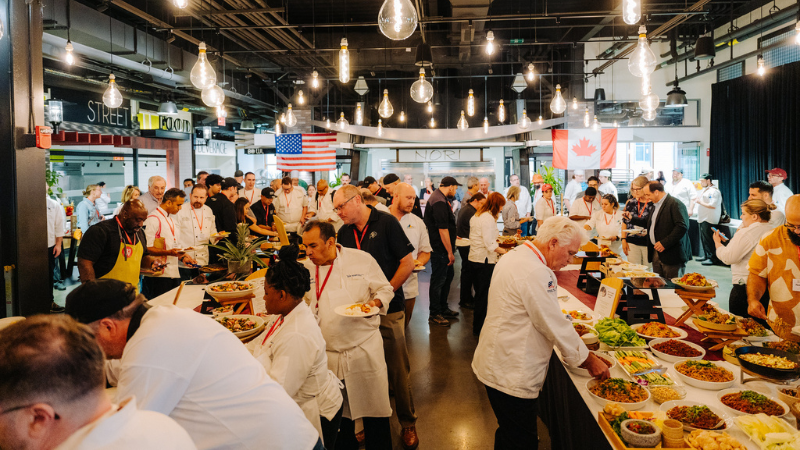
CHICAGO, June 23, 2025 — If there’s a world record for the most insights shared during a single food event, the folks at Guinness likely had to update the benchmark after last week’s Chef Culinary Conference.
For six packed days, attendees drawn from every facet of the college and university (C&U) foodservice market were provided with a look (and sometimes a full Technicolor movie) of what they can expect in the near and not-so-near future.
The event built on presentations from celebrated chefs like Dan Barber and Alice Waters with hands-on kitchen time, where attendees prepared meals that fit the trends highlighted on stage. On one line was a team preparing Persian food, cheek-to-jowl with a group preparing comfort dishes a grandmother might lovingly serve.
Presentations touched on topics ranging from the seed oil controversy to how to work with manufacturers to what college students want from their school’s foodservices. The latter insight was provided by students themselves in what amounted to a focus group on stage.
An exhibition area provided samples of everything from kelp-based meatballs (known as Seaweedish Meatballs) to an array of new plant-based meat analogs and proteins.
The event, hosted by the University of Massachusetts at Amherst, allowed the school’s celebrated foodservice department to demonstrate why it’s been ranked as the best C&U program in the nation for eight straight years. One night the team catered a plated meal built around a fish fillet for more than 400 people—only to be followed a night later with a clambake for 700, with a whole lobster available for each diner. (UMass-Amherst, which serves two lobster dinners to students during a typical academic year, is reputed to be the nation’s largest buyer of lobsters.)
The event, now in its 31st year, is meticulously planned by the school’s head of foodservice, Ken Toong, to address the issues shaping C&U foodservice.
Here are some of the insights that were brought to light.
RFK Jr. isn't popular among C&U professionals
Wellness considerations were interwoven into almost every presentation, a reflection of the conference’s unofficial theme that taste, variety, and health are table stakes for any C&U dining program.
That mindset steered several speakers to invoke U.S. Health & Human Services Secretary Robert F. Kennedy, Jr. and his Make America Healthy Again (MAHA) initiative. Invariably, the mention drew hoots, boos and other demonstrations of disapproval from the audience of chefs, foodservice directors, nutritionists and suppliers.
Clearly the secretary’s health philosophy was a far cry from what they held to be true.
The allure of innovation may be overstated
Several long-hallowed beliefs of the food-away-from-home business were called into question during the conference. One jaw-dropping example: The belief that innovation is what snags consumers’ attention, at least when Gen Z diners are the target.
Data provided by Maeve Webster, president of the research and consulting firm Menu Matters, showed members of that age cohort are less driven than earlier generations by novelty. About 47% of surveyed Gen Z consumers, or less than half, said their heads are turned by new and unique foods, ingredients and dishes.
In addition, 54% of Gen Z consumers indicated they’re turned off by foods that are unfamiliar to them.
It’s just as well, Webster contended, because creativity was dampened by the pandemic and has yet to rebound.
“Our industry has been under threat,” she said. “Innovation has taken an enormous hit.”
C&U kitchens are going electric
Restaurants have vigorously resisted efforts by local lawmakers to phase out gas-powered kitchen equipment because it’s believed to be more damaging to the environment than electric devices would be. Fine-dining chefs have been particularly outspoken, saying electric stoves don’t provide the control or high heat that some menus require.
Environmental considerations have apparently allayed resistance in the C&U market. At least two representatives of standout collegiate foodservice operations, the University of Michigan and the University of Colorado at Boulder, revealed while speaking on separate panels that their schools are committed to going electric.
Paul Houle, Assistant Vice Chancellor for Student Affairs at the University of Colorado, said all new kitchens built at the Boulder campus will be 100% electric powered. “It’s a sustainability play,” Houle said.
Frank Turchin, Executive Chef at Michigan, indicated that all the kitchens he oversees are switching to electric equipment “over the next couple years.”
Plant-forward movement is still moving forward
The mega-trend of studding menus with more plant-based items may be generating less buzz today, but is in no way losing force, a variety of speakers attested during the conference. As University of Michigan’s Turchin put it, “Plant-based is getting bigger and bigger.”
What may be changing is the label applied to the trend. Several presenters mentioned that the once-preferred terms “plant-forward” and “meat analog” may be used less often today than tags like “plant based.”
Who knew Alice Waters was a party animal?
Given the importance C&U foodservice puts on local sourcing and healthful eating, it’s not a surprise the annual conference has repeatedly featured farm-to-table pioneer Alice Waters as a keynote speaker. What seemed to delight attendees as much as the Chez Panisse chef-owner’s wisdom and wit was her acknowledgment of enjoying the party aspects of the event.
At a dinner honoring Waters, the icon was invited to the podium to say a few words. She opened with the comment, “I may have had too much rose franc,” the French wine Europeans drink in volume during the summer.
The next night’s dinner featured a live band playing covers of popular rock songs. First out on the dance floor: 81-year-old Waters.
As Managing Editor for IFMA The Food Away from Home Association, Romeo is responsible for generating the group's news and feature content. He brings more than 40 years of experience in covering restaurants to the position.
Cover image courtesy: Closed Loop Project